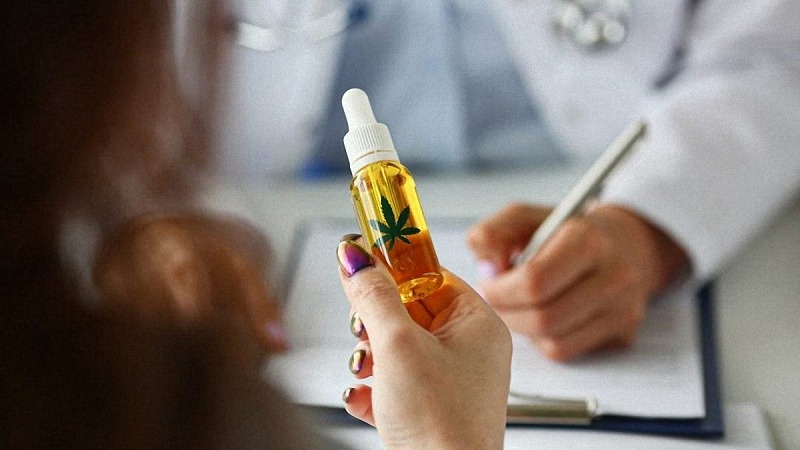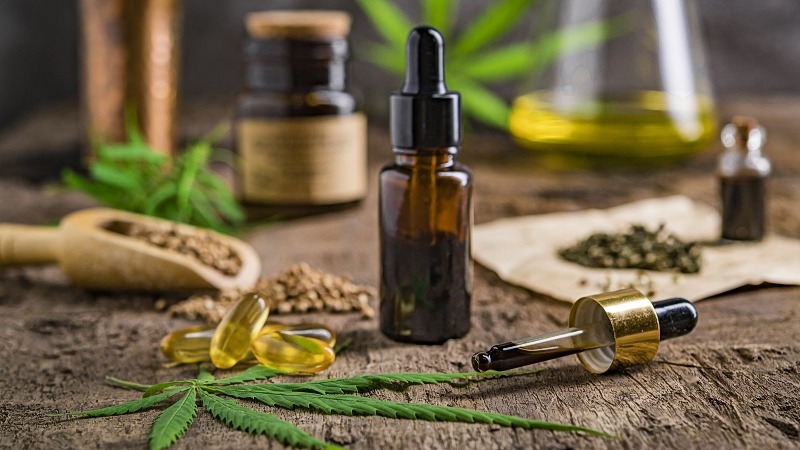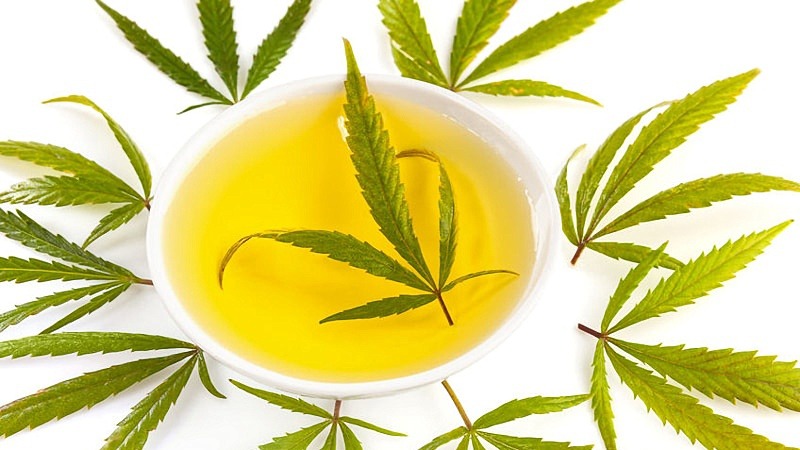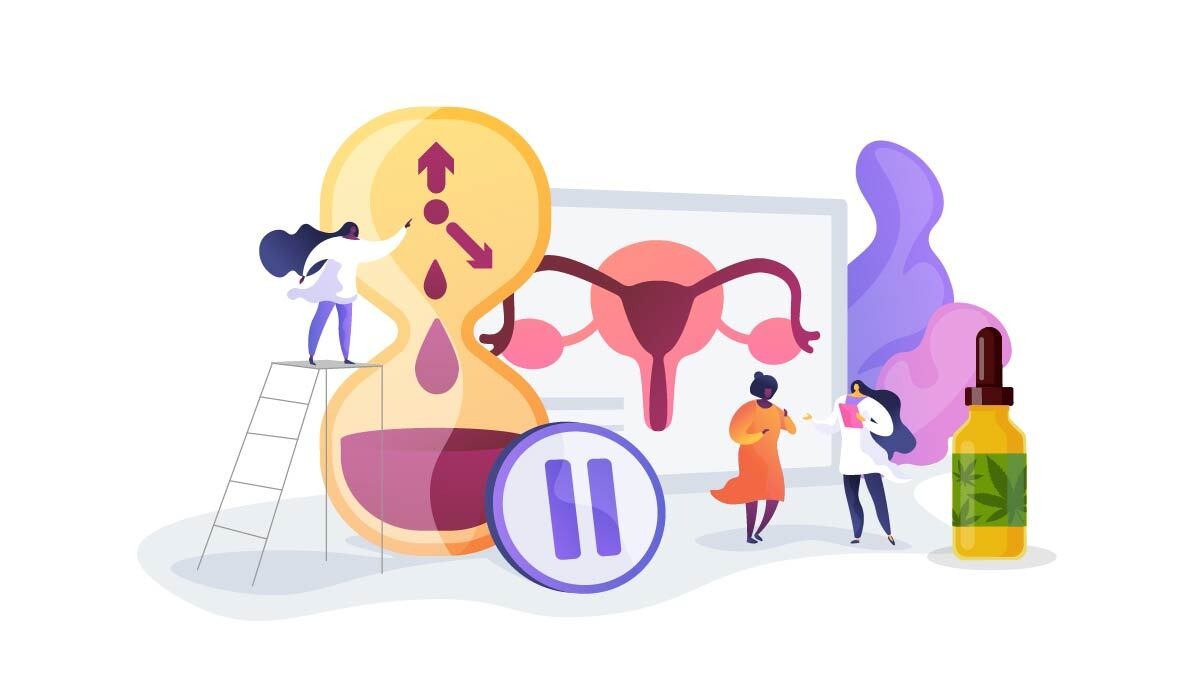The lead-up to menopause (perimenopause) usually begins in women aged between 45 and 55. This period can last for seven to 14 years.
During this time, many women experience a range of symptoms — some mild, some severe, and impacting the quality of life.
Effective treatments that curb menopausal symptoms are few and far between.
CBD is a promising supplement for use during the transition into menopause.
This article will look at all the facts, how CBD can ease menopausal symptoms, and find the best CBD products for menopause.
What is Menopause?
12 months after a woman’s last period is known as the start of menopause. This is the point where a woman’s periods cease, and she is no longer able to get pregnant naturally.
The period leading up to menopause is called the menopausal transition. The menopausal transition usually begins in women aged 45 to 55 and usually lasts for around 7 years. However, in some cases, the transition can last up to 14 years.
Menopause is a natural part of the aging process. However, during the menopausal transition, estrogen and progesterone (two hormones made in the ovaries) fluctuate drastically.
The fluctuation of hormone levels can cause a variety of symptoms. For example, bones become less dense, making women in transition more vulnerable to breaks and fractures. The body also uses energy differently during the transition; this can lead to weight gain as fat cells change.
There are many other symptoms associated with the menopausal transition. Although menopause is a natural part of aging, the symptoms can lower a person’s quality of life.
The Symptoms of Menopause
Menopausal symptoms vary from person to person.
Most women will experience menopausal symptoms, but some may experience them worse than others. Some symptoms can be quite severe and affect day-to-day life; other symptoms are minor nuisances that can cause discomfort and frustration.
The body goes through many changes during the menopausal transition. Fluctuations in hormone levels are what cause these symptoms.
The most common menopausal symptoms are:
- Hot flashes
- Night sweats
- Difficulty sleeping
- Reduced libido (sex drive)
- Vaginal dryness
- Discomfort during sex
- Increased emotional response
- Depression & anxiety
- Issues with memory & concentration
- Weight gain
- Muscle aches
- Joint pain
- Osteoporosis
How Can CBD Help with Menopause?

CBD interacts with the endocannabinoid system (ECS). The ECS is made up of several cannabinoid receptors in the brain and body. These receptors play an important role in regulating several bodily functions.
Its CBD’s interaction with the endocannabinoid system makes it a promising supplement for women going through the menopausal transition.
CB1 and CB2 receptors found in the endocannabinoid system play a part in:
- The function of the immune system
- Pain responses
- Inflammation responses
- Sleep onset & duration
- Memory function
- Fertility
- Mood regulation
When cannabidiol (CBD) is consumed, it interacts with the CB1 and CB2 receptors in the ECS. In turn, it may influence some of the functions above.
Controlling these bodily functions may reduce certain menopausal symptoms.
Menopausal Symptoms that CBD May Help
1. Depression, Anxiety, and Changes in Mood
Mood changes are common during menopause.
Hormone imbalances can influence the activity of serotonin and dopamine — affecting mood and emotional responses.
This can lead to spouts of depression and anxiety.
Studies suggest CBD is an effective treatment for certain anxiety disorders [1]. Similar studies have also discovered the potential of using CBD to treat many mental health conditions, including depression [2].
CBD may be an effective treatment for the mood-related symptoms associated with the menopausal transition.
2. Muscle Aches and Joint Pain
Muscle aches and joint pain are common symptoms of menopause. Often, women feel more achy and stiff during the transition.
When estrogen levels drop, the body produces an excess of inflammatory molecules. Therefore, a sudden drop in estrogen may lead to inflammation in the joints. This can lead to arthritis-like symptoms in women during menopause.
CBD has pain-relieving and anti-inflammatory qualities.
One study that looked into CBD’s effect on arthritis symptoms discovered that transdermally-applied CBD reduced joint swelling and pain responses in rats with osteoarthritis [3].
Other studies have looked into the value of certain cannabinoids (including CBD) in managing difficult-to-treat pain [4]. The research concluded that both CBD and THC significantly reduce pain associated with certain chronic pain conditions.
CBD may be an effective compound for treating aches and pains during menopause. Research suggests that both ingested and topically-applied CBD may reduce pain and inflammation.
3. Night Sweats and Hot Flashes
Hot flashes and night sweats are two more common symptoms of the menopausal transition. It’s often the most talked about a symptom that women experience during menopause.
The hypothalamus regulates changes in body temperature. However, hormone imbalances can affect the chemistry in the hypothalamus, which can cause the body to deactivate its cooling abilities at random.
Sweating and vessel dilation are the typical responses that will be activated, causing sweats and hot flashes.
CBD may reduce hot flashes and help in the regulation of hypothalamus responses during menopause.
There’s limited research into CBD’s effects on hot flashes specifically. However, cannabidiol’s effect on serotonin may help regulate body temperature during the menopausal transition.
4. Weight Gain
Some women experience weight gain during menopause. This is due to lower estrogen levels in the body.
Women with low estrogen levels and men with low testosterone levels can experience weight gain.
Without estrogen, the body doesn’t burn as many calories as before. As a result, less fat is burned during physical activities, and more fat may be gained when estrogen levels are low.
CBD may help women going through menopause stay slim by boosting metabolism and lowering blood sugar levels.
One study discovered that the body could turn white fat into brown fat [5].
Brown adipose tissue (brown fat) is easier for the body to use as energy. White fat (bad fat) is the fat type that is associated with rapid weight gain.
When white fat is converted to brown fat, the body can burn the fat as fuel more effectively. Thus, leading to weight loss.
Although studies into CBD’s effects on weight loss, weight gain, and obesity are in their early days, the current facts are promising. CBD could help regulate body weight in women that are going through the transition.
5. Sleep Problems
Women going through menopause may experience issues with sleep. This could be difficulty sleeping, waking up in the middle of the night, or experiencing sleepiness during the day.
Sleep problems can arise for many reasons during menopause.
Raised anxiety levels, night sweating, and hot flashes are the main reasons women struggle with sleep during menopause.
CBD has anti-anxiety qualities and may help regulate the body’s temperature response. This alone might be enough to encourage and regulate sleep.
Studies also suggest that CBD encourages deep sleep by reducing the time the body and mind stay in the REM sleep stage [6].
THC vs. CBD: What’s the Best Option for Menopause?

Scientific studies that look into the effects of THC and CBD on menopausal symptoms are limited. However, there’s far more evidence to support the use of CBD for women going through menopause.
Many women use cannabis during menopause to deal with their symptoms. The psychoactive effects of the THC in cannabis products may induce sleep, aid in relaxation, and provide pain relief.
When looking at anecdotal evidence, there’s no doubt that THC helps some women through the menopausal transition. However, the impairing effects of the cannabinoid may put some people off.
CBD can benefit health and may reduce several symptoms associated with menopause. In addition, it doesn’t impair the user (won’t get you high) as THC does, and daily life can resume as normal while the cannabinoid is used.
As far as research is concerned, CBD is more effective for treating menopause. Its pain-relieving, anti-inflammatory, sleep-promoting, and anti-anxiety qualities are well-documented and could help women going through menopause.
However, THC and cannabis as a whole may provide some women relief from symptoms while offering a therapeutic “high” that can induce relaxation, relieve stress, and help with sleep.
How to Use CBD Oil for Menopause?
1. Choosing the Best Type of CBD for Menopause
There are three options to choose from when buying CBD.
You may have heard of the terms full-spectrum, broad-spectrum, and CBD isolate before. These are different types of CBD extracts. Each type of CBD extract contains cannabidiol, but they differ in the contents of other active cannabinoids.
So, what’s the difference between these extracts?
A) Full-Spectrum CBD for Menopause
Full-spectrum CBD contains cannabidiol and all the other active cannabinoids and terpenes naturally present in the hemp plant. These extracts do contain THC at levels below 0.3%. THC at this percentage will not impair the user, but it may show up on drug tests.
Full-spectrum CBD is considered the most effective of the CBD extracts. This is because CBD has combined with the other naturally occurring cannabinoids in hemp, and it becomes far more effective at treating a wider range of conditions.
This phenomenon is known as the entourage effect [7].
Full-spectrum CBD is the best type of CBD for menopause because you will benefit from the full entourage effect. However, if you react poorly to THC, other cannabinoids in hemp, or undergo regular drug screening for work, broad-spectrum or CBD isolate may be better.
B) Broad-Spectrum CBD for Menopause
Broad-spectrum CBD is similar to full-spectrum CBD because it contains the other active cannabinoids and terpenes present in the hemp plant. However, broad-spectrum CBD contains no traces of THC.
Because this type of CBD contains no THC, it has no chance of showing up on a drug test after consumption. You also benefit from the entourage effect as broad-spectrum CBD contains a full cannabinoid profile otherwise.
Broad-spectrum CBD is perfect if you’re looking for relief from menopause symptoms, want to benefit from the entourage effect, and don’t want to consume any THC.
C) CBD Isolate for Menopause
CBD isolate is a pure extract of CBD. It contains cannabidiol only without any other cannabinoids or terpenes present.
You will not benefit from the entourage effect as you would with full- and broad-spectrum products. However, CBD isolates are still a valuable supplement for women going through menopause.
CBD isolate perfect for women who want to use CBD to treat menopausal symptoms but want to avoid THC and other cannabinoids altogether.
2. Choosing the Best CBD Product for Menopause

Now we’ve covered the three types of CBD extract; it’s time to look at the different CBD products that are effective for menopausal symptoms.
You’ll find these products in both full-spectrum and broad-spectrum, as well as CBD isolates.
The perfect product for you will depend on your personal preferences and what works best for you. Therefore, it may take some time to figure out which CBD product suits you best.
When using CBD to treat menopause for the first time, it’s wise to try various products.
A) CBD Oil for Menopause
CBD oil is one of the most popular and basic forms of CBD. It’s sublingually absorbed using a dropper to apply drops under the tongue.
This form of CBD is highly bioavailable and gives you ultimate flexibility overdosages. You can adjust the dose by simply dropping more or fewer drops under the tongue.
CBD oil is a great product to start with if you’re new to CBD. It’s easy to monitor your intake and figure out what your optimum dose is.
B) CBD Edibles for Menopause
CBD edibles come in many forms, with gummies is the most popular and prominent.
Edibles are fantastic if you don’t like the taste of CBD and want a delicious way to supplement with cannabidiol. Edibles are available in a variety of potencies, with each treat containing an accurate dose of CBD.
CBD edibles are less bioavailable than oil as some of the cannabinoids are lost during digestion. However, they offer an accurate and easy way to supplement CBD for menopause without taking a pill, applying oil sublingually, or inhaling the vapor.
C) CBD Capsules for Menopause
CBD capsules come in dry capsule and soft gel formats. Like edibles, they’re ingested, so they aren’t as bioavailable as oil. However, they offer a tasteless and accurate way to consume CBD.
Capsules take longer to work, but the effects last much longer than edibles, CBD oil, and vaporized CBD.
Capsules are a great option if you want a hassle-free way to consume CBD to reduce menopausal symptoms. One capsule in the morning and one in the evening is usually enough to reduce the symptoms of menopause.
D) CBD Vape Pens for Menopause
CBD vape pens have a heating element that vaporizes a mixture of vegetable glycerin, propylene glycol, and CBD extract.
The vapor produced is inhaled, and the CBD is absorbed into the bloodstream quickly through the oxygen exchange in the lungs’ alveoli.
When CBD is inhaled as a vapor, it has a high bioavailability. As a result, it can relieve symptoms in as little as 15 minutes, but the effects usually wear off in 2 to 4 hours.
CBD vape pens are a great option if you’re looking for fast relief from menopausal symptoms. However, they aren’t recommended for people who suffer from respiratory conditions.
E) CBD Topicals for Menopause
CBD topicals come in many forms. You’ll find CBD-infused creams, balms, gels, and bath products.
CBD topicals are applied to the skin to be absorbed through the dermal and subdermal layers.
They provide localized pain and inflammation relief. This makes them perfect for people suffering from aches, pains, and joint inflammation during the menopausal transition.
CBD Dosage for Menopause

There’s no specific dose of CBD for menopause.
Everyone reacts slightly differently to cannabidiol, and the other cannabinoids naturally present hemp. This makes recommending a specific dose difficult.
A variety of factors can influence the amount of CBD needed for treating menopausal symptoms:
- Bodyweight
- Age
- Metabolism
- Severity of symptoms
- Potency and type of CBD extract
The best way to find your optimum dose of CBD is by gradually increasing the amount you consume over time and monitoring its effects on your body.
CBD oil is by far the easiest way to start using CBD for menopause.
Start with a low dose of CBD applied under the tongue to ensure your body reacts well to the new supplement. Once you’re sure your body has no negative reactions, you can increase the dose by one to two drops every two days.
When you start to notice a reduction in symptoms, you’ve found your optimum dose. From here, you can continue to supplement with the same dose.
If you want to try edibles or capsules after trying oil, figuring out your dosage is simple. Just work out the potency of the dose you’ve been consuming and use the same amount of CBD in milligrams in capsule or edible form.
If the edibles or capsules don’t seem to be working at the same dose as the CBD oil, increase your intake. This is easier with gummies as you can split them into halves or quarters.
Final Thoughts: Does CBD Help Ease Menopause Symptoms?
CBD is a promising supplement to use during the menopausal transition.
CBD may help ease various physical symptoms like aches and joint pain, hot flashes and night sweats, and weight gain. It may also help aid sleep, regulate mood, lower anxiety levels, and help fight depression.
Women across the globe use cannabis and/or CBD to curb their menopausal symptoms with great results.
Although studies into CBD and menopause are lacking, there’s plenty of evidence that suggests it may help curb symptoms and make the transition period much more bearable.
When selecting a CBD product:
- Consider which type of CBD is best for you (full- & broad-spectrum, or CBD isolate)
- Do plenty of research on the company
- Check third-party lab results
- Try a range of products to find out what works best for you
- Start with a low dose of CBD
- Increase the dose gradually until you notice an effect on symptoms
References Used In This Article
- Blessing, E. M., Steenkamp, M. M., Manzanares, J., & Marmar, C. R. (2015). Cannabidiol as a potential treatment for anxiety disorders. Neurotherapeutics, 12(4), 825-836.
- Khan, R., Naveed, S., Mian, N., Fida, A., Raafey, M. A., & Aedma, K. K. (2020). The therapeutic role of Cannabidiol in mental health: a systematic review. Journal of Cannabis Research, 2(1), 1-21.
- Hammell, D. C., Zhang, L. P., Ma, F., Abshire, S. M., McIlwrath, S. L., Stinchcomb, A. L., & Westlund, K. N. (2016). Transdermal cannabidiol reduces inflammation and pain‐related behaviours in a rat model of arthritis. European Journal of Pain, 20(6), 936-948.
- Russo, E. B. (2008). Cannabinoids in the management of difficult to treat pain. Therapeutics and clinical risk management, 4(1), 245.
- Rossi, F., Punzo, F., Umano, G. R., Argenziano, M., & Miraglia Del Giudice, E. (2018). Role of cannabinoids in obesity. International journal of molecular sciences, 19(9), 2690.
- Babson, K. A., Sottile, J., & Morabito, D. (2017). Cannabis, cannabinoids, and sleep: a review of the literature. Current psychiatry reports, 19(4), 1-12.
- Russo, E. B. (2019). The case for the entourage effect and conventional breeding of clinical cannabis: no “strain,” no gain. Frontiers in plant science, 9, 1969.

